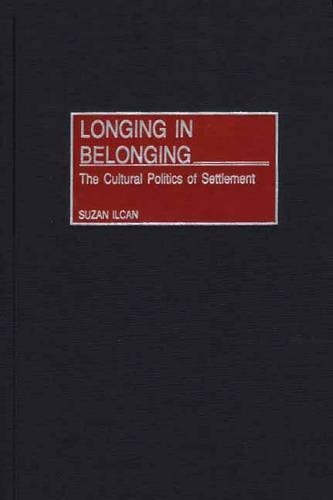
Longing in Belonging: The Cultural Politics of Settlement
(Hardback)
Publishing Details
Longing in Belonging: The Cultural Politics of Settlement
By (Author) Suzan Ilcan
Bloomsbury Publishing PLC
Praeger Publishers Inc
30th April 2002
United States
Classifications
Tertiary Education
Non Fiction
Social impact of environmental issues
304.20956
Physical Properties
Hardback
152
Description
Explores the social and gender relations that define home, particularly within Middle Eastern cultures. Ilcan draws attention to the struggles in our "places" of habitation and the strategies deployed to subvert the habits of settlement. The home is an interesting place to begin. Home is a notion that is mobile and transitory. As it extends through space and moves through time, it delimits inclusions and exclusions, defines gender identities and differences, and is often at the center of nation-building strategies. Home is constantly destabilized by use, that is, by the cultural and political representations that deploy, contrive, or subvert its traditions. Ilcan provides a unique inquiry into the cultural politics of home. She emphasizes the social and gender relations that define home, not only in terms of their disciplinary and regulatory effects, but also in terms of their dynamic consequences for Middle Eastern cultures. She tackles some contemporary and critical issues such as the articulation of private and political spaces, the politics of lived space, modes of longing and belonging, narrativity and the practice of changing places. These issues are explored from a conceptual and methodological strategy for understanding the spaces where many rural women live and work, the kinds of settlements they form, and the manifold ways they resist and change these settled ways. A provocative analysis for scholars, students, and researchers in Sociology and Anthropology, Middle Eastern, Women's, and Cultural Studies.
Reviews
This work of theory and ethnography on the Turkish diaspora makes an important contribution to the growing literature on cultural and identity formations and other social relations under conditions of diaspora and transnationalism. Instead of fixed sites and institutions, Ilcan focuses on spaces and practices created by mobility as people experience dispersion, transition, and displacement from national, regional, or ethnic locations, an enormous global phenomenon in the mid- to late 20th century. By definition unstable, these transnational and diasporic communities and their migratory networks make necessary adjustments to recurring patterns of settlement and resettlement, contributing to migrant nationalism and the nation building process....Upper-division undergraduates and above.-Choice
"This work of theory and ethnography on the Turkish diaspora makes an important contribution to the growing literature on cultural and identity formations and other social relations under conditions of diaspora and transnationalism. Instead of fixed sites and institutions, Ilcan focuses on spaces and practices created by mobility as people experience dispersion, transition, and displacement from national, regional, or ethnic locations, an enormous global phenomenon in the mid- to late 20th century. By definition unstable, these transnational and diasporic communities and their migratory networks make necessary adjustments to recurring patterns of settlement and resettlement, contributing to migrant nationalism and the nation building process....Upper-division undergraduates and above."-Choice
Author Bio
SUZAN ILCAN is Asssociate Professor in the Department of Sociology and Anthropology, University of Windsor. Among her earlier books are Postmodernism and the Ethical Subject, co-edited with B. Gabriel, and Transgressing Borders: Critical Prespectives on Gender, Household, and Culture, co-edited with L. Phillips (Bergin & Garvey, 1998).
